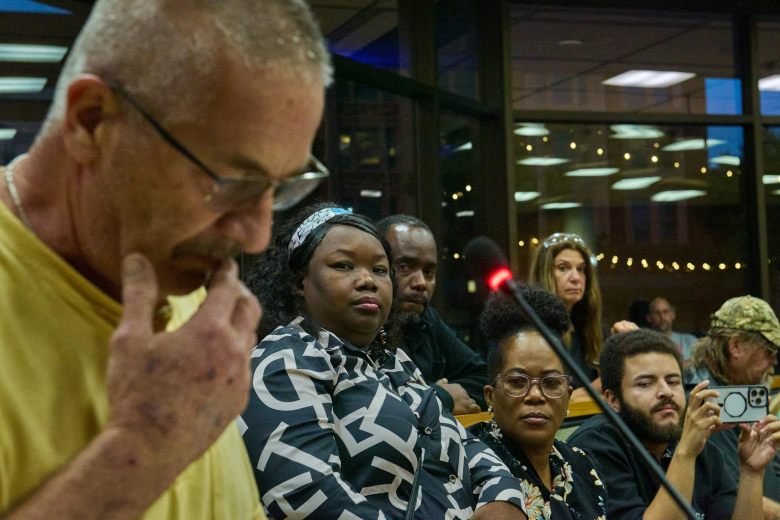Since 2021, about 15,000 Haitians have discovered new lives in Springfield, Ohio, after fleeing the violence of Haiti, their native nation.
However a wave of baseless rumors and hate, amplified by former President Donald Trump and his operating mate, U.S. Sen. JD Vance, has shattered that sense of security. Lots of the metropolis’s Haitian immigrants are left questioning whether or not their imaginative and prescient of an American dream continues to be doable.
Frightened and frightened, many Haitians say they’re terrified of going exterior and staying in Springfield.
The morning after the presidential debate, a Haitian girl who had moved to Springfield six years in the past advised a newspaper reporter that “they’re attacking us in each method.”
Along with the anxiousness, the lady, who requested to not be recognized, mentioned that her automobile home windows had been damaged in the midst of the evening. “I’m going to have to maneuver as a result of this space is not good for me,” the lady mentioned. “I can’t even depart my home to go to Walmart. I’m anxious and scared.”
Trump’s inflammatory statements, which have included wrongful allegations of Haitians consuming pets, are a part of a broader historic sample of racism and anti-Black xenophobia within the U.S. geared toward Haitians. Days after the talk, Trump further explained how he would begin his mass deportation program in Springfield. “Unlawful Haitian migrants have descended upon a city of 58,000 folks, destroying their lifestyle,” Trump mentioned.
The feedback haven’t solely stoked existing racial tensions however have additionally sparked racist discourse and violent threats towards Haitians throughout the nation.
As a scholar of migration who has studied Haitian immigrants within the U.S. for over 25 years, I’ve seen how Haitians, as Black immigrants, are doubly marginalized, by not solely the structural racism embedded in U.S. immigration insurance policies but in addition the broader societal racism skilled by Black People.
In my opinion, Trump’s baseless allegations mirror America’s deeply rooted historical past of systemic racism towards Haiti and its folks.
A flawed historical past
The roots of anti-Haitian racism within the U.S. might be traced to the Haitian Revolution in 1804 during which Black Haitians who have been enslaved rose up and overthrew the French colonial authorities.
Haiti grew to become the primary impartial Black republic on this planet, and the nation’s independence terrified many within the U.S., particularly white slaveholders. They feared the revolution may encourage slave revolts at dwelling.
Bettmann/Getty Images
For a lot of the nineteenth century, the U.S. refused to acknowledge Haiti as a legit nation. It wasn’t till 1862, in the course of the Civil Battle, that the U.S. lastly established diplomatic relations with the nation.
However the U.S. continued to use Haiti for its personal financial and army pursuits, occupying the nation with the army from 1915 to 1934. Throughout this era, the U.S. controlled Haiti’s government and funds, put in a pro-American president and helped set up a brutal army drive.
The occupation worsened racial and financial inequality in Haiti and additional destabilized the nation.
This historical past of exploitation and interference has had long-lasting results on Haiti’s skill to develop economically and politically, a state of affairs exacerbated by continued U.S. intervention all through the Chilly Battle period.
Throughout the practically 30-year dictatorships of François “Papa Doc” and Jean-Claude “Child Doc” Duvalier between 1957 and 1986, for instance, the U.S. authorities provided approximately US$900 million in monetary assist to those repressive regimes, regardless of their infamous human-rights abuses.
Anti-Black immigration insurance policies
All of the historical past of U.S. involvement in Haiti set the stage for the mass migration of Haitians to the U.S. for the reason that early Nineteen Sixties.
Through the years, about 200,000 Haitians have sought to flee violence and poverty to the U.S.
These with assets, such because the Haitian elite and center class, migrated legally, settling in New York and Miami. A lot of them organized ways to ship assist to Haiti and introduced consideration to human-rights abuses being dedicated by the Duvalier regimes.
Poor Haitians quickly adopted, arriving by crude boats.
In September 1963, the primary boatload of Haitian refugees landed in Miami. However as an alternative of discovering freedom, all 23 Haitians have been denied asylum and despatched again to Haiti by the U.S. immigration authorities.
Since then, Haitians arriving by boat have faced arrest, detention, asylum denials and deportation as successive U.S. governments refused to acknowledge the political repression in Haiti. As an alternative, Haitians have been labeled financial migrants who sought a greater lifestyle and, as such, weren’t eligible for asylum.
From 1981 to 1991, as an illustration, 433 boats carrying roughly 25,580 Haitians were intercepted by U.S. immigration authorities. Solely 28 folks have been allowed to pursue refugee claims.
The Haitian expertise within the US
Typically portrayed by white policymakers as disease carriers and criminals, Haitian immigrants have lengthy suffered discrimination and dehumanization within the U.S.
Within the Nineteen Eighties, in the course of the HIV disaster, U.S. well being officers wrongly labeled Haitians as high-risk carriers of the virus, reinforcing dangerous racial and ethnic stereotypes.
Regardless of a lack of scientific evidence, Haitians have been stigmatized as a bunch, resulting in economic and social exclusion throughout the U.S. Many Haitians misplaced jobs, housing and confronted threats of violence merely due to their nationality and ethnicity.
My research has proven this portrayal of Haitians as harmful and undesirable persists immediately, as mirrored in Trump’s and Vance’s current claims. The narrative of immigrants consuming pets and spreading illnesses is a recycled trope in American historical past, utilized by white conservative politicians to stoke fears about foreigners to bolster white supremacy.
Traditionally, these sorts of claims have been used to justify exclusionary immigration policies and racial violence towards nonwhite populations.

Dominic Gwinn/Middle East Images /Getty Images
The accusations towards Haitians in Springfield haven’t solely triggered immediate threats of violence however have additionally bolstered deep-seated, anti-Black xenophobia that continues to plague U.S. society.
Lately, hate speech and assaults towards Black immigrants, together with Haitians, have been on the rise. Black immigrants, no matter their authorized standing, face higher rates of deportation and are more likely to be targeted than white immigrants by regulation enforcement.
Addressing anti-Haitian racism
The allegations made by Trump and Vance characterize a harmful escalation of rhetoric that has real-life penalties for Haitians within the U.S.
The demonization of Haitians in Springfield is not only a political ploy – it’s a part of a broader technique to uphold methods of exclusion which have traditionally been used to marginalize Black folks, each immigrants and residents.![]()
Thurka Sangaramoorthy, Professor of Anthropology, American University
This text is republished from The Conversation below a Inventive Commons license. Learn the original article.

